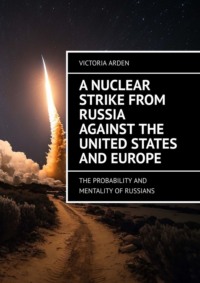Loe raamatut: «A nuclear strike from Russia against the United States and Europe. The probability and mentality of Russians»
© Victoria Arden, 2024
ISBN 978-5-0065-0996-2
Created with Ridero smart publishing system
In recent years, the international situation has significantly worsened, which raises concerns about the possibility of a nuclear conflict. Nuclear powers such as Russia, the United States and European countries continue to build up their arsenals and modernize the means of delivering nuclear weapons. In the context of geopolitical tensions caused by the conflicts in Syria and the Middle East, the question of the likelihood of a nuclear strike is becoming increasingly relevant. Discussing the mentality and strategic thinking of Russian leaders in the context of nuclear weapons is necessary to understand how cultural and historical factors influence decisions about their use.

Goals and objectives of the book
The purpose of this book is to analyze the likelihood of a nuclear strike from Russia against the United States and Europe, as well as to consider the mentality and strategy behind the possible actions of the Russian authorities. The tasks of the book include:
1. A study of the historical context and evolution of Russia’s nuclear strategy.
2. Assessment of modern threats and risks associated with nuclear weapons.
3. Analysis of the influence of the mentality and perception of nuclear weapons on decision-making in Russia.
4. Consideration of the consequences of a possible nuclear strike and ways to prevent a nuclear conflict.

Chapter 1: Historical context
The Cold War and nuclear strategy
The Cold War (1947—1991) was a period of intense confrontation between the Soviet Union and the West, in particular, the United States. At this time, both sides were building up their nuclear arsenals, creating strategic and tactical nuclear forces. Nuclear weapons had become an important element of foreign policy, and both sides viewed them as a means of deterring the enemy.
The doctrine of Mutual Assured Destruction (MAD): One of the key concepts of the Cold War, based on the assumption that the use of nuclear weapons by one side would lead to an imminent retaliatory strike, which, in turn, would destroy both sides. This doctrine provided relative stability, albeit in the face of constant fear of a nuclear catastrophe.
Cuban Missile crisis: In 1962, the world was on the verge of nuclear war due to the deployment of Soviet missiles in Cuba. This crisis has demonstrated the complexity of nuclear deterrence and the importance of diplomacy in managing nuclear risks.
The post-Soviet period: changes in nuclear policy
After the collapse of the Soviet Union in 1991, Russia’s nuclear policy underwent significant changes. The deteriorating economic situation and internal conflicts have led to a rethink of strategies related to nuclear weapons.
Reducing the nuclear arsenal: In the early 1990s, Russia signed a number of arms control agreements, such as the Strategic Offensive Arms Reduction Treaty (START-1) and the Comprehensive Nuclear Test Ban Treaty (CTBT). These agreements have contributed to reducing nuclear stockpiles and reducing tensions.
The revival of nuclear potential: In the early 2000s, with the coming to power of Vladimir Putin, Russia began the process of reviving its nuclear potential. Old systems were upgraded and new ones were developed, such as the Yars and Sarmat missile systems, which created new opportunities for strategic deterrence.
Modern conflicts and their impact on nuclear relations
Modern international conflicts, such as the crisis the wars in Syria and the Middle East, have had a significant impact on nuclear relations between Russia and the West.
The impact on strategic deterrence: Modern conflicts have changed the approach to nuclear deterrence. Russia is actively developing new nuclear systems that can bypass the existing missile defense systems of the United States and NATO, which increases tensions.
Global challenges: Climate change, terrorism and cyber threats also require attention. Russia views these challenges as factors that can affect its national security and, consequently, its nuclear weapons policy.
Tasuta katkend on lõppenud.
